Key takeaways:
- Grief in ministry is complex and impacts not only the individual but the entire community, requiring careful navigation to support both the pastor and congregation.
- Pastoral care is essential during times of grief, fostering community bonds and collective healing through shared vulnerability and emotional support.
- Active listening and providing practical resources are effective strategies for supporting grieving individuals, helping them feel less isolated in their pain.
- Building a support network of peers and trusted individuals is crucial for ministers, enabling shared experiences and mutual healing during challenging times.
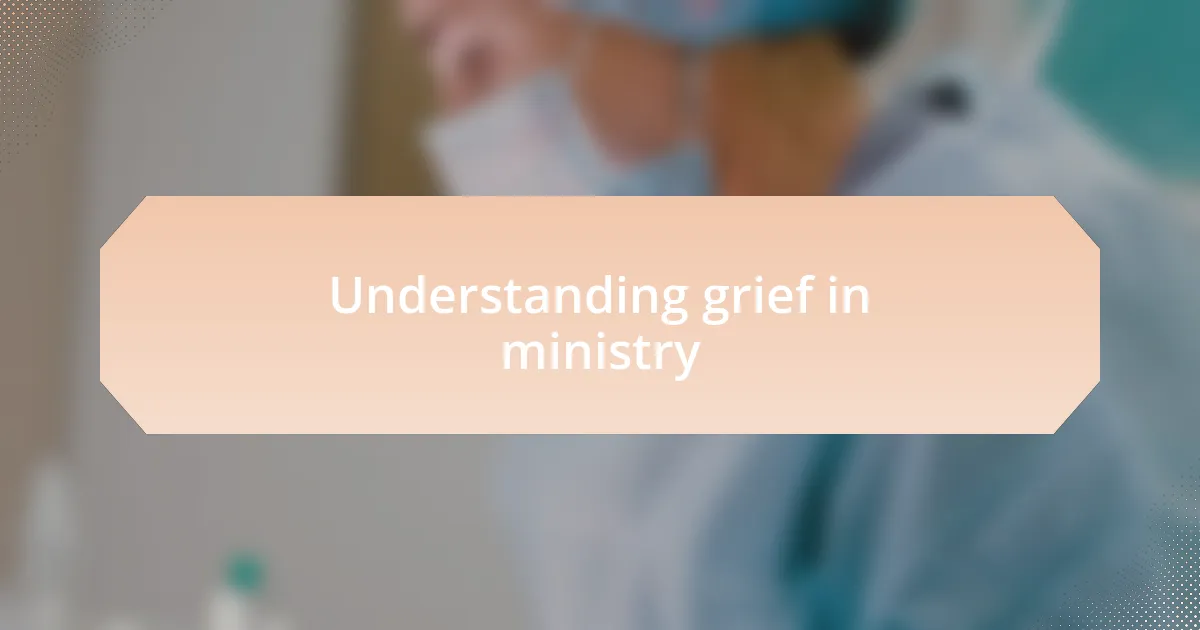
Understanding grief in ministry
Grief in ministry is complex and often multifaceted. I remember the first time I lost a member of my congregation; it felt like losing a part of myself. How do you navigate that kind of pain while also being the person others lean on for support?
The impact of grief can go beyond just the individual; it can ripple through the entire community. I often noticed how collective mourning affected not just worship services but the very fabric of our gatherings. When everyone is grieving, it raises the question: How do we create space for healing without losing sight of our mission?
Understanding grief in ministry also means acknowledging the isolation it can bring. I’ve felt the weight of others’ expectations while wrestling with my own emotions. Have you ever felt like you had to put on a brave face, even when your heart was aching? It’s a delicate balance, but I’ve learned that being open about my own struggles can foster deeper connections with those I serve.
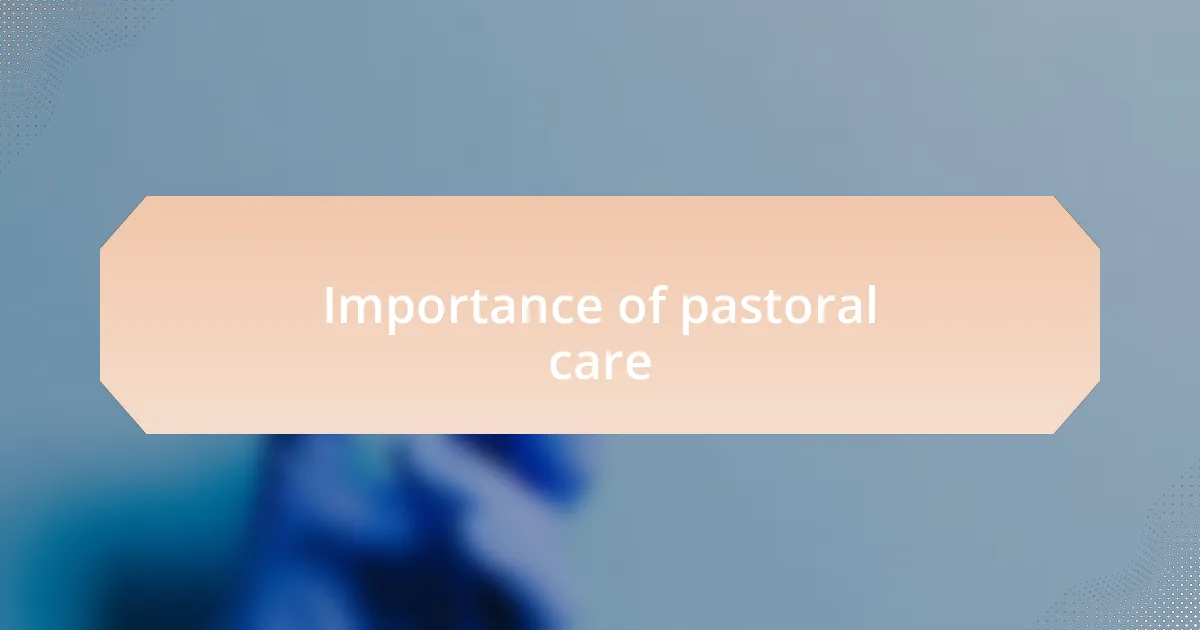
Importance of pastoral care
Pastoral care serves as a lifeline for both clergy and congregation during times of grief. There was a moment when I received a call from a grieving family just hours after losing their loved one. Being present for them, listening to their stories, and offering a comforting word were crucial; it reinforced that my role wasn’t just about preaching but about genuinely caring for those in pain.
Beyond individual support, pastoral care fosters a sense of community. I recall initiating a grief support group after a particularly challenging loss in our church. The shared tears and laughter not only deepened relationships among congregation members but also empowered each person to heal collectively. How often do we overlook the strength found in this connection?
The emotional weight that pastoral care carries cannot be underestimated. I’ve often felt drained after ministering to those in sorrow, yet witnessing their resilience and hope has inspired me. Isn’t it remarkable how, through shared vulnerability, both the pastor and the flock can experience healing together? This is the profound impact of pastoral care; it transforms grief into a journey of healing for everyone involved.
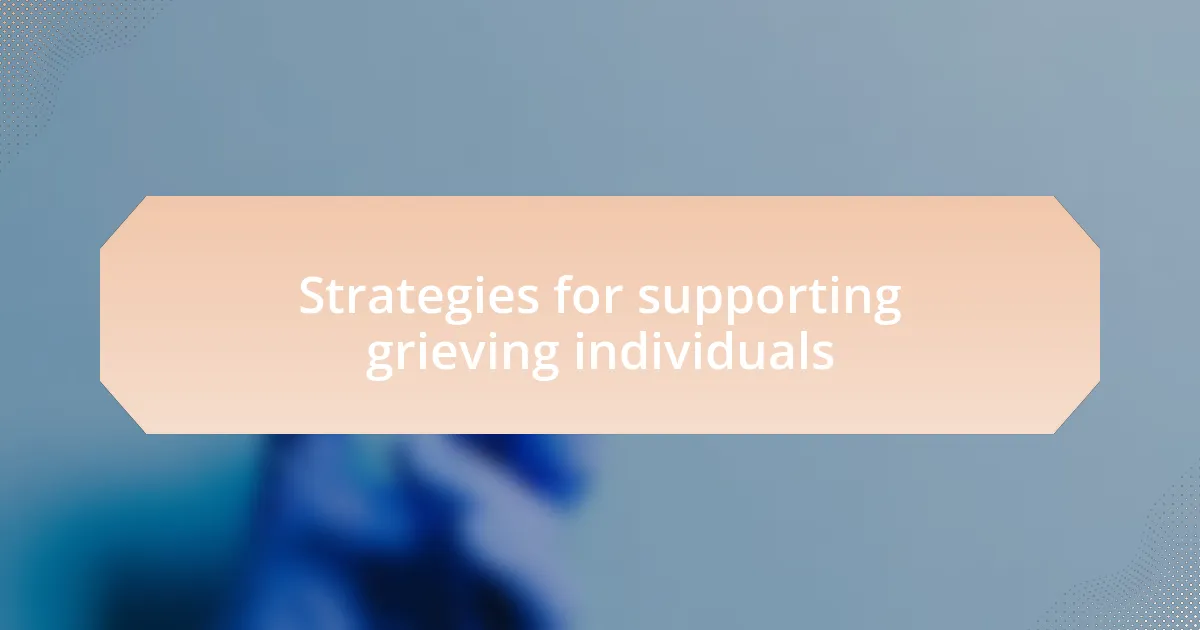
Strategies for supporting grieving individuals
One effective strategy I’ve learned is the importance of active listening. I remember sitting in a hospital room with a widow who had just lost her partner. Instead of filling the space with comforting platitudes, I simply listened. This made all the difference; it allowed her to express her grief without judgment. How often do we forget that sometimes, simply being there speaks volumes?
Another approach is to share practical resources. In my experience, providing families with information on bereavement services or support groups can help them feel less alone. Once, I handed out a brochure about local grief counselors during a service. It felt rewarding to empower someone with the tools for their healing journey. Isn’t it reassuring to know we can give people a path forward when they feel lost?
Creating a safe space for emotional expression cannot be overlooked. I recall hosting a memorial service where congregants were encouraged to share memories of the deceased. The flood of stories and laughter mixed with tears revealed a profound truth: grieving isn’t just about loss; it’s also about celebrating a life. Have you ever experienced the liberating release that comes from honoring those we’ve lost? It’s a powerful part of the healing process.

Personal experiences with grief
Grief is a deeply personal journey that often takes unexpected turns. I remember the weight of loss when I unexpectedly lost a dear friend. It hit me hard, being someone whose role was to support others. I found myself grappling with a mix of sadness and guilt—how could I, a minister, feel so lost? That moment shone a light on the reality that grief doesn’t discriminate, even in ministry.
There was one evening, after receiving news of another loss, when I chose to write down my feelings instead of keeping them bottled up. I crafted a letter to my friend, sharing everything I wished I could tell him one last time. Writing became a soothing balm for my soul and allowed me to process my emotions in a way I had never tried before. Have you ever tried writing as a means of coping? It’s fascinating how putting pen to paper can unravel emotions you didn’t even know you were holding onto.
In another instance, while revisiting a familiar spot where we used to talk, I was struck by memories that flooded back. It was bittersweet, filled with laughter and tears. That experience underscored how grief doesn’t just take; it can also deepen our appreciation for the time we shared. I learned that revisiting cherished memories can sometimes be both painful and cathartic. How can we honor those we’ve lost while also allowing ourselves the space to heal? It’s a delicate balance, but one worth navigating.
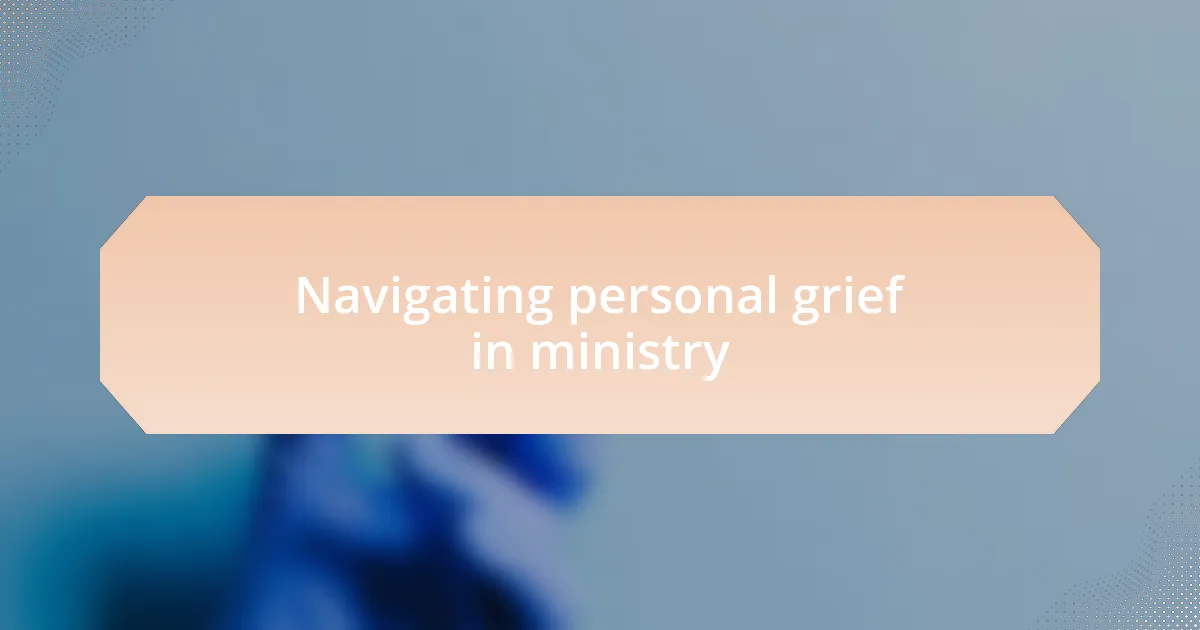
Navigating personal grief in ministry
Navigating personal grief in ministry can often feel like walking a tightrope. I recall one particularly challenging Sunday morning when I shared the news of my loss with the congregation. Standing before them, I fought back tears, realizing that my own grief had become a touchpoint for others who were also mourning. It’s a reminder that vulnerability in leadership can foster deeper connections, but it also leaves us exposed.
I once attended a supportive grief group tailored for ministers. It was overwhelming to sit in a circle with others who understood the unique challenges we face in our roles. I remember listening to their stories and feeling a sense of relief—recognizing that we all carry our burdens, regardless of how strong we appear to others. Have you ever found solace in shared vulnerability? That experience taught me the power of communal grieving; it can be a source of strength that we often overlook.
On some days, the weight of my grief would catch me off guard, especially during quiet moments of reflection. I remember sitting alone in my office, staring at a picture of my friend and battling waves of sadness. During those moments, I learned to give myself permission to feel—not just as a minister, but as a human being. How often do we forget that even those who guide others need time to heal? Embracing our own grief is not a weakness; it can be a profound act of honesty that ultimately enriches our ministry.
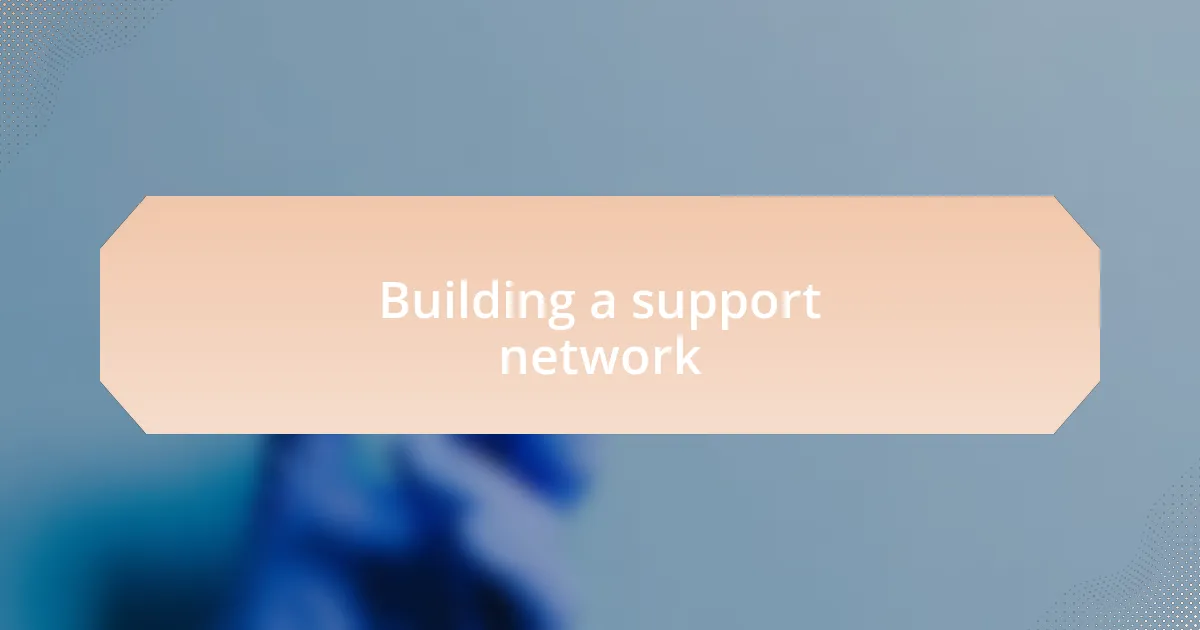
Building a support network
Building a support network in ministry is crucial for navigating grief. I remember when a close colleague reached out to me after learning of my loss; it was a simple text that said, “I’m here if you need to talk.” Just knowing that someone cared enough to reach out made me feel less alone, and we started sharing coffee breaks regularly to check in on each other. It’s amazing how small gestures can lead to a strong foundation of support.
Over time, I recognized the importance of surrounding myself with individuals who understood the unique pressures ministers face. I began to cultivate relationships not only with other pastors but also with lay leaders and trusted friends outside the church. Those conversations often turned into shared experiences, where we could express our fears and vulnerabilities openly. Have you ever sought solace in the company of those who truly get it? I found that being part of such a network created a safe space for healing, where we could lean on one another during tough times.
Looking back, I realize that building this network takes intentional effort. It wasn’t enough just to wait for others to notice I was struggling; I had to step out of my comfort zone and invite others into my journey. I made it a point to attend community events and engage more with my peers, forging connections that would later become my lifeline. It’s a reminder that while we might feel isolated in our grief, reaching out can spark the kind of camaraderie that not only lifts us up but also enriches our ministry in ways we never expected.